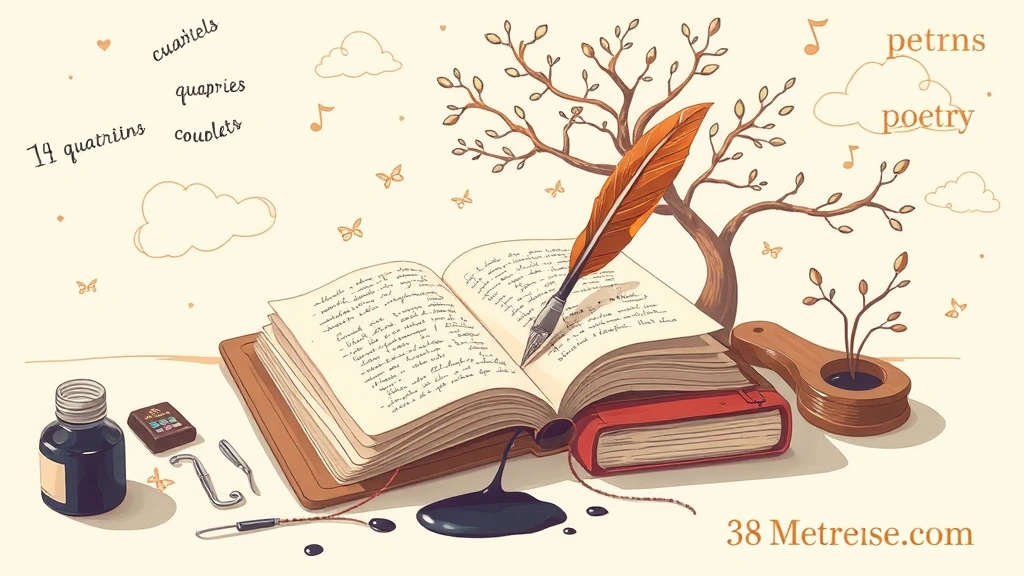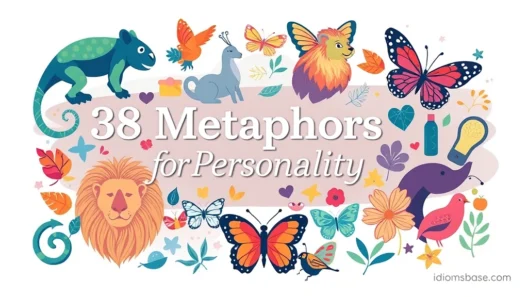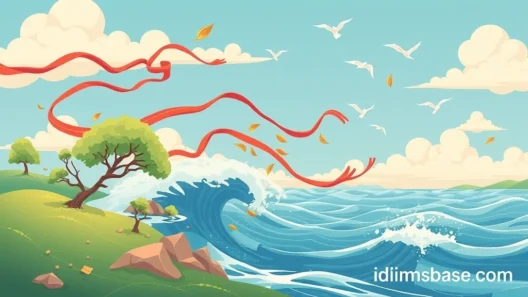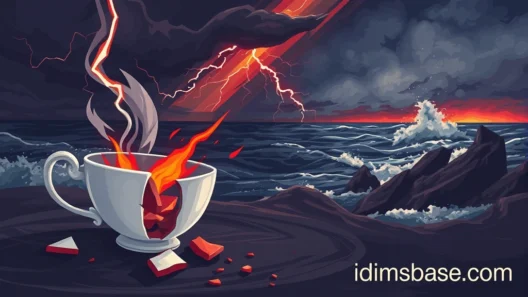Have you ever tried to describe something beautiful, complex, or deeply moving, only to find words failing you? That's often how people feel when they try to talk about poetry. It’s more than just lines on a page; it’s an experience, a journey, a whisper from the soul. But how do we truly capture its essence?
One of the most powerful tools in our literary toolbox is the metaphor. Metaphors allow us to understand one thing in terms of another, painting vivid pictures in our minds. And when it comes to poetry, metaphors are simply magical! They help us grasp its many facets, from its delicate beauty to its raw power.
In this article, we're going on an exciting adventure to explore 38 incredible metaphors that describe poetry. Get ready to see poetry in a whole new light!
38 Metaphors for Poetry
Poetry is a chameleon, constantly shifting its colors and forms. Here are 38 ways to think about it, each revealing a different truth:
Poetry as a Journey or Exploration
- A Map to the Soul: Like a map, poetry guides you through emotions and experiences, helping you navigate your inner world.
- A Winding Path: It’s not always straight; sometimes it twists and turns, leading you to unexpected places and insights.
- A Starlit Voyage: Poetry can transport you to distant realms of imagination, much like sailing under a sky full of stars.
- A Deep Dive: It invites you to plunge beneath the surface of everyday life, exploring hidden depths of meaning.
- An Uncharted Territory: Each poem can feel like a brand new land, waiting for you to discover its secrets.
Poetry as a Living Entity or Force
- A Breathing Organism: Poetry lives and breathes, changing with each reading, growing with your understanding.
- A Gentle Breeze: It can caress your spirit, bringing comfort and a sense of calm, much like a soft wind.
- A Raging River: Sometimes, poetry is powerful and unstoppable, carrying you along with its current of emotion.
- A Whispering Echo: It speaks to you from across time and space, leaving lasting impressions in your mind.
- A Pulsating Heartbeat: Poetry can resonate with your own rhythms, reflecting the very pulse of life itself.
Poetry as a Craft or Creation
- A Woven Tapestry: Each word is a thread, intricately woven together to create a beautiful, complex design.
- A Sculpted Statue: Like a sculptor, the poet carefully shapes words, giving form to abstract ideas and feelings.
- A Crafted Jewel: Polished and precise, every line sparkles with meaning and beauty, like a finely cut gem.
- A Painted Canvas: Poetry uses words as colors, creating vivid images and scenes in your mind's eye.
- A Constructed Bridge: It connects disparate ideas, emotions, and experiences, helping you cross divides.
Poetry as a Source of Light or Illumination
- A Guiding Beacon: In times of darkness, poetry can offer clarity and direction, like a lighthouse in a storm.
- A Flickering Candle: It illuminates small truths, casting a warm glow on overlooked details.
- A Burst of Sunlight: Poetry can break through the clouds, bringing sudden joy and revelation.
- A Shining Mirror: It reflects your own thoughts and feelings, helping you see yourself more clearly.
- A Glimmering Star: Distant yet constant, poetry offers a point of inspiration and wonder.
Poetry as a Form of Communication or Expression

- A Primal Scream: Sometimes, poetry is a raw, unfiltered outpouring of emotion, a cry from the depths.
- A Tender Embrace: It can offer comfort and understanding, like a warm, reassuring hug.
- A Shared Secret: Poetry often feels intimate, as if the poet is confiding something deeply personal to you.
- A Lingering Melody: It has a rhythm and flow that stays with you, humming in your mind long after you've read it.
- A Silent Conversation: Even without words spoken aloud, poetry communicates profound truths between reader and writer.
Poetry as a Container or Vessel
- A Treasure Chest: Filled with hidden gems of wisdom, insight, and beauty, waiting to be discovered.
- A Fragrant Perfume Bottle: A small container holding powerful, evocative essences that linger and delight.
- A Delicate Vase: Holding the beautiful, fragile blossoms of human emotion and thought.
- A Magic Potion: It can transform your perspective, offering enchantment and new ways of seeing the world.
- A Time Capsule: Preserving moments, feelings, and ideas from the past for future generations to unearth.
Poetry as a Natural Phenomenon
- A Blooming Flower: Starting as a small seed, it unfurls its petals, revealing layers of beauty and complexity.
- A Gentle Rain: It can cleanse and refresh your spirit, nourishing your mind and soul.
- A Crashing Wave: Powerful and rhythmic, it can overwhelm you with its force and beauty.
- A Silent Snowflake: Each one unique and perfect, melting into your consciousness, leaving a momentary trace.
- A Roaring Fire: It can ignite your passions, warm your heart, or even consume you with its intensity.
Poetry as a Tool or Instrument
- A Sharp Scalpel: Poetry can precisely cut through superficiality, revealing deeper truths and complexities.
- A Healing Balm: It soothes wounds, offering comfort and solace in times of pain.
- A Master Key: It unlocks doors to understanding, empathy, and new perspectives.

Key Takeaways
Wow, that was quite the journey, wasn't it? We've explored so many incredible ways to think about poetry. Here are the main things to remember:
- Poetry is Multifaceted: There isn't just one way to describe poetry. It's a complex art form that can be understood through many different lenses.
- Metaphors Enrich Understanding: Using metaphors helps us grasp abstract concepts like poetry in concrete, imaginative ways. They make the intangible feel tangible.
- Personal Connection is Key: Ultimately, how you perceive poetry is deeply personal. Each metaphor might resonate differently with you, depending on your experiences.
- Poetry is a Living Art: It's not static. It breathes, changes, and interacts with us, offering new insights every time we engage with it.
Frequently Asked Questions (FAQ)
Q1: Why are metaphors so important for understanding poetry?
Metaphors are crucial because poetry often deals with abstract ideas, emotions, and experiences that are hard to put into direct words. By comparing poetry to something concrete – like a map, a river, or a jewel – metaphors make these abstract concepts more relatable and easier to visualize. They spark your imagination and deepen your understanding, allowing you to connect with the poem on a more profound level.
Q2: Can these metaphors apply to reading poetry, writing poetry, or both?

Absolutely, these metaphors apply to both reading and writing poetry! When you're reading, they help you appreciate the poem's layers of meaning and the poet's skill. For example, thinking of poetry as a "treasure chest" makes you eager to discover its hidden gems. When you're writing, these metaphors can inspire your creative process. Imagining your poem as a "sculpted statue" might encourage you to carefully shape each word, while "a painted canvas" might inspire you to use vivid imagery.
Q3: How can I use these metaphors to improve my own poetry?
You can use these metaphors in several exciting ways!
- Inspiration: Let them inspire your themes or central ideas. Maybe you want to write a poem that truly feels like "a deep dive" into an emotion.
- Imagery: Use the metaphors directly within your poems as imagery. Imagine writing a poem where "words are threads, weaving a tapestry of thought."
- Perspective: Think about what kind of "tool" or "force" you want your poem to be. Do you want it to be "a healing balm" or "a sharp scalpel"? This helps define your poem's purpose and tone.
- Structure: Some metaphors, like "a winding path" or "a crafted jewel," can even influence the structure or form of your poem.
Q4: Are there any "bad" metaphors for poetry?
While beauty is in the eye of the beholder, a "bad" metaphor is usually one that is cliché, doesn't add new insight, or actively confuses the reader. For example, saying "poetry is like words" isn't very helpful because it's too literal and doesn't offer a fresh perspective. A good metaphor sparks imagination and reveals a new facet of the thing being described. The best metaphors are original, vivid, and surprising.
Q5: How do different cultures perceive poetry through metaphors?
That's a fantastic question! While some metaphors, like poetry as a "song" or a "story," are fairly universal, many cultural nuances exist. For instance, in some Eastern traditions, poetry might be more closely linked to concepts of meditation, nature's cycles, or philosophical contemplation, leading to metaphors like "a flowing stream of wisdom" or "a garden of contemplation." In Western traditions, you might find more emphasis on individual expression or narrative, leading to metaphors like "a personal confession" or "a dramatic monologue." Exploring these cultural differences can really enrich your understanding of global poetry!
Q6: What's the difference between a metaphor and a simile when describing poetry?
That's a classic question! The main difference lies in how they make the comparison.
- Metaphor: States that one thing is another thing. It creates a direct, often powerful, identification. For example: "Poetry is a treasure chest." (It is the chest.)
- Simile: Compares two different things using "like" or "as." It suggests a similarity rather than a direct identity. For example: "Poetry is like a treasure chest." (It is like the chest.)
Both are figures of speech that enhance understanding, but metaphors tend to be more evocative and create a stronger imaginative leap.
Q7: Can a single poem embody multiple metaphors?
Absolutely! In fact, most rich and complex poems will evoke multiple metaphorical understandings. A single poem might feel like "a gentle breeze" in one stanza, then transform into "a raging river" in the next, and ultimately serve as "a guiding beacon" by its conclusion. This layering of metaphors is what gives poetry its incredible depth and resonance, allowing it to be experienced on many different levels simultaneously.
Conclusion
We hope this exploration of 38 metaphors has opened your eyes to the boundless beauty and complexity of poetry. It’s truly an amazing art form that continues to surprise and inspire us.
Which metaphor resonated most with you? Do you have a favorite way to describe poetry that we didn't mention? Share your thoughts in the comments below! We'd love to hear your unique perspectives on this incredible journey called poetry.






